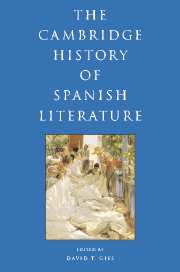Book contents
- Frontmatter
- I INTRODUCTION
- II HISTORY AND CANONICITY
- III THE MEDIEVAL PERIOD
- IV EARLY MODERN SPAIN: RENAISSANCE AND BAROQUE
- V THE ENLIGHTENMENT AND NEOCLASSICISM
- VI THE FORGING OF A NATION: THE NINETEENTH CENTURY
- VII THE MODERN, MODERNISMO, AND THE TURN OF THE CENTURY
- VIII TWENTIETH-CENTURY SPAIN AND THE CIVIL WAR
- 41 Poetry between 1920 and 1940
- 42 Prose: early twentieth century
- 43 The commercial stage, 1900–1936
- 44 Theatrical reform and renewal, 1900–1936
- 45 Federico García Lorca
- IX IN AND OUT OF FRANCO SPAIN
- X POST-FRANCO SPANISH LITERATURE AND FILM
- Bibliography
- Index
- References
42 - Prose: early twentieth century
from VIII - TWENTIETH-CENTURY SPAIN AND THE CIVIL WAR
Published online by Cambridge University Press: 28 March 2008
- Frontmatter
- I INTRODUCTION
- II HISTORY AND CANONICITY
- III THE MEDIEVAL PERIOD
- IV EARLY MODERN SPAIN: RENAISSANCE AND BAROQUE
- V THE ENLIGHTENMENT AND NEOCLASSICISM
- VI THE FORGING OF A NATION: THE NINETEENTH CENTURY
- VII THE MODERN, MODERNISMO, AND THE TURN OF THE CENTURY
- VIII TWENTIETH-CENTURY SPAIN AND THE CIVIL WAR
- 41 Poetry between 1920 and 1940
- 42 Prose: early twentieth century
- 43 The commercial stage, 1900–1936
- 44 Theatrical reform and renewal, 1900–1936
- 45 Federico García Lorca
- IX IN AND OUT OF FRANCO SPAIN
- X POST-FRANCO SPANISH LITERATURE AND FILM
- Bibliography
- Index
- References
Summary
In the critical perspectives on the literature of the 1920s and 1930s that were engineered, often opportunistically, in the postwar period, prose writers received scant attention and were usually left to languish in the shadow of a select group of poets. As those perspectives, together with the generic distinctions they stressed, became more entrenched, reiterated in response to pressures that were as much pedagogical as they were political or aesthetic, so the marginal status of the prose writers of the time was reinforced. It has taken a considerable effort in recent decades to pull back into focus the complex realities of the period in order to acknowledge that the climate of renewal and innovation identified with poetry also determined other forms of writing as well as the creative arts as a whole. It has become increasingly evident that during those years prose writers either pursued objectives that complemented those of contemporary poets or developed alongside them their own independent initiatives that helped to shape the literary sensibilities of the time. No credible review of the literature of the so-called “Silver Age” of Spanish letters can now afford to overlook those practitioners of prose. The difficulty lies, rather, in doing justice to the range of their writing and the different directions in which it moved.
- Type
- Chapter
- Information
- The Cambridge History of Spanish Literature , pp. 569 - 578Publisher: Cambridge University PressPrint publication year: 2005



